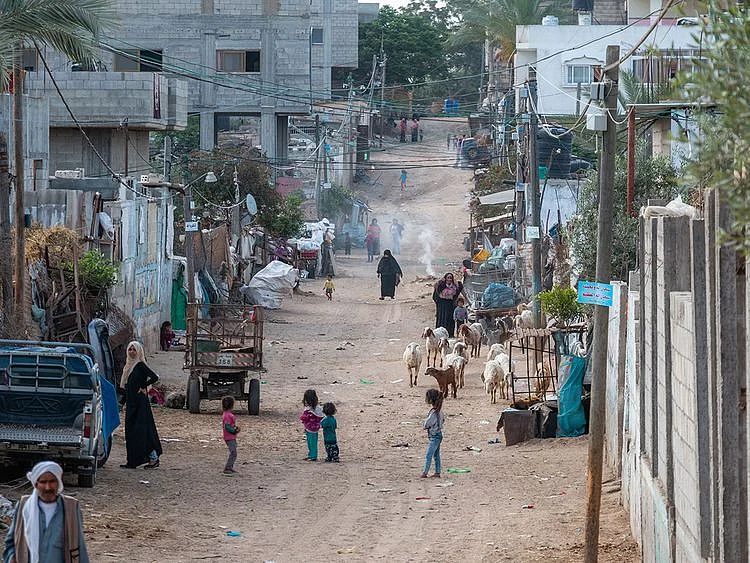A World Health Organisation (WHO) report released last month sheds more light on the water crisis in Palestine, particularly in the besieged Gaza Strip.
WHO indicated that 97 per cent of water pumped from Gaza’s aquifer, which is depleting at a rapid rate, fails to meet the minimum standards of quality for potable water.
In fact, the very sustainability of the Gaza Strip’s basin is now in jeopardy. WHO findings further confirm a previous United Nations report that Gaza could become uninhabitable by 2020.
Alas, it appears that this is to be the horrific reality for Gaza.
The occupied West Bank is not much better off as Palestinians are denied access to their own water resources. They are unable to dig new wills in most of the West Bank, forbidden from utilising Jordan River water and are forced to purchase nearly a quarter of their own water from Israel.
This is completely unacceptable and runs contrary to international law.
Free access to water is a basic human right.
A protracted discussion on water as a human right culminated in a UN General Assembly resolution, 64/292 of July 28, 2010. It explicitly “recognises the right to safe and clean drinking water and sanitation as a human right that is essential for the full enjoyment of life and all human rights.”
It all makes perfect sense. There can be no life without water. But like every other human right, Palestinians are denied that as well.
Total water control was one of the first policies enacted by Israel after the establishment of the military regime following the occupation of East Jerusalem, the West Bank and Gaza in June 1967.
Israel’s discriminatory policies can be described as “water apartheid”.
Cementing Palestinian dependency
Excessive Israeli water consumption, erratic use of dams and denying Palestinians the right to their own water has resulted in vast and possibly irreversible environmental consequences, fundamentally altering the aquatic ecosystem altogether.
In the West Bank, Israel uses water to cement existing Palestinian dependency on the very Israeli occupation.
Israel uses a cruel form of economic dependency to keep Palestinians reliant and subordinate. This model is sustained through the control of borders, military checkpoints, collection of taxes, border closures, military curfews and denial of building permits.
Water dependency is a centrepiece in this strategy.
The “Interim Agreement on the West Bank and the Gaza Strip”, known as the Oslo II Agreement signed in September 1995, crystallised the unfairness of Oslo I, which was signed in September 1993. Over 71 per cent of Palestinian aquifer water was made available for Israeli use and only 17 per cent for Palestinian use.
More appallingly, the new agreement invited a mechanism that forced Palestinians to buy their own water from Israel, further cementing the client relationship between the Palestinian Authority (PA) and Israel.
The Israeli water company, Mekorot, a government-owned company, misuses its privileges to reward and punish Palestinians as it sees fit.
In the summer of 2016, entire Palestinian communities in the West Bank went without water as the PA failed to pay Israel massive sums of money to purchase back Palestinian water.
Palestinians in the West Bank use about 72 litres of water per person per day, compared to 240-300 litres for Israelis.
Waterborne diseases
The political responsibilities of such unequal distribution of available water resources can be attributed to both the cruel Israeli occupation and the shortsighted vision of the Palestinian leadership. The situation in Gaza is even worse. Even before the WHO report, other organisations have been reaching similar findings, although no real remedy is yet to be offered.
According to Oxfam, “less than four per cent of freshwater (in Gaza) is drinkable and the surrounding sea is polluted by sewage”. Oxfam researchers concluded that water pollution is dangerously linked to a dramatic increase in kidney problems in the Gaza Strip.
The US-based RAND Corporation found that one-fourth of all diseases in the besieged Gaza Strip are waterborne.
Gaza hospitals are trying to fight the massive epidemic while being underequipped, suffering power cuts and themselves lacking clean water.
“Water is frequently unavailable at Al-Shifa, the largest hospital in Gaza,” the RAND report continues. “Even when it is available, doctors and nurses are unable to sterilise their hands to carry out surgery because of the water quality.”
These water policies are mere facets in a much larger war against the Palestinian people to reinforce Israel’s colonial control.
While much attention has been rightly given to the military aspect of the Israeli occupation, Israel’s colonial policies involving water, receive far less attention yet are crucial.
It is a pressing and critical problem, however, that must be addressed and remedied as Gaza is being slowly poisoned while the West Bank is victimised by an ongoing water apartheid.
Ramzy Baroud is a journalist, author and editor of Palestine Chronicle. His last book is The Last Earth: A Palestinian Story (Pluto Press, London).
Sign up for the Daily Briefing
Get the latest news and updates straight to your inbox
Network Links
GN StoreDownload our app
© Al Nisr Publishing LLC 2026. All rights reserved.
